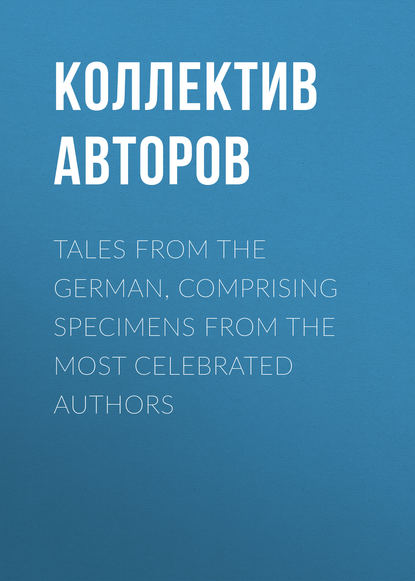По всем вопросам обращайтесь на: info@litportal.ru
(©) 2003-2024.
✖
Tales from the German, Comprising specimens from the most celebrated authors
Настройки чтения
Размер шрифта
Высота строк
Поля
"With all due respect to your skill, dear breakfast-maker, you aged and experienced cook, you have never been able to make the soup or dumplings so delicious."
The cook also tasted it, shook the dwarf reverentially by the hand, saying, "My little man, you are a master of your art, yes, that herb 'stomach comforter' imparts a peculiar charm to the whole."
At this moment the duke's valet entered the kitchen, and informed them that the duke wished his breakfast. The preparations were now dished up in silver, and sent up to the duke; but the head cook took the dwarf to his own room to converse with him. They had scarcely sat down long enough to say half a paternoster, when a messenger came and called the head cook to the duke. He quickly put on his best clothes, and followed the messenger.
The duke looked well pleased, He had eaten all they had served, and was just wiping his beard as the master-cook entered. "Master," said he, "I have hitherto always been well satisfied with your cooks; but tell me who prepared the breakfast this morning? It never was so delicious since I sat on the throne of my fathers; tell me the name of the cook, that I may send him a ducat as a present."
"My lord, this is a strange story," replied the master; and he told the duke that a dwarf had been brought to him that morning, who earnestly solicited the place of a cook, and how all had happened. The duke was greatly astonished, ordered the dwarf to appear, and asked him who he was, and whence he came. Now poor James did not exactly wish to say that he had been enchanted, and had served as a squirrel. But yet he adhered to truth, telling him that he now had neither father nor mother, and had learned cooking of an old woman. Much amused by the strange appearance of his new cook, the duke asked no more questions, but said, "If you wish to remain here, I will give you fifty ducats a-year, a suit of livery, and two pair of breeches beside. Your duty shall be to prepare my breakfast; yourself every day to give directions how the dinner shall be prepared, and to take the general superintendence of the cooking. As each in my palace has his proper name, you shall be called 'Nose,' and hold the office of sub-master-cook."
The dwarf prostrated himself before the mighty duke, kissed his feet, and promised to serve him faithfully.
Thus the dwarf was for the present provided for, and did honour to his office. And it must be remarked that the duke had become quite an altered man since Nose the dwarf had been in the palace. Formerly, he had often been pleased to throw the dishes and plates that were served up at the heads of the cooks; indeed, he even once, in a fit of rage, threw a fried calf's foot that was not sufficiently tender, with such violence at the head of the master-cook, that the latter fell to the ground, and was compelled for three days to keep his bed. 'Tis true, the duke made him amends for what he had done by some handfuls of ducats, but still no cook ever came before him with his dishes, without trembling and terror.
Ever since the dwarf had been in the palace, all seemed to be changed, as if by magic. The duke, instead of three, had now five meals a day, in order to relish properly the skill of his little servant, and yet never showed the least sign of discontent. Indeed, he found all new and excellent, was kind and pleasant, and became fatter daily.
He would often in the midst of a meal send for the master-cook and the dwarf, set one on his right, and the other on the left hand, and put with his own gracious fingers some morsels of the delicious viands into their mouths; a favour which both knew how to appreciate fully. The dwarf was the wonder of the whole town, and people requested the permission of the master-cook to see him cook, while some of the principal folks prevailed upon the duke to permit their servants to profit by the instructions of the dwarf in his kitchen, by which he obtained much money, for those who came to learn paid daily half a ducat. In order, however, to keep the other cooks in good humour, and prevent jealousy, Nose let them have the money that was paid by the masters for instruction.
Thus Nose lived almost two years in great comfort and honour, the thought of his parents alone saddening him, and nothing remarkable occurring until the following circumstance happened. The dwarf being particularly clever, and fortunate in his purchases, went himself, as often as time permitted, to the market, to buy poultry and fruit. One morning he went to the poultry-market, and walking up and down inquired for fat geese such as his master liked. His appearance, far from creating laughter and ridicule, commanded respect, since he was known as the duke's celebrated cook, and each poultry-woman felt herself happy if he but turned his nose to her. At length coming to the end of a row of stalls, he perceived in a corner, a woman with geese for sale, who did not, like the others, praise her goods, nor call to the customers.
He stepped up to her, examined the geese, weighed them in his hand, and finding them to his liking, bought three, with the cage they were in, put them on his shoulders and trotted home. It appeared singular to him that only two of the geese cackled and cried like others, the third being quite quiet and thoughtful, and occasionally groaning and moaning like a human being.
"She is not well," said he to himself, "I must hasten to get home and dress her." But the goose replied, distinctly,
"If thou stick'st me,
Why I'll bite thee,
And if my neck thou twistest round.
Thou soon wilt lie below the ground."
Quite startled, the dwarf put down the basket, and the goose, looking at him with her fine intelligent eyes, sighed. "Why what have we here?" cried Nose. "You can talk, Miss Goose. I never expected that. Well, make yourself easy; I know the world and will not harm so rare a bird. But I would wager something that you have not always been covered with feathers. Indeed I was once a poor squirrel myself."
"You are right," replied the goose, "in saying I was not born with this disgraceful disguise. Alas! it was never sung at my cradle that Mimi, the great Wetterbock's daughter, would be killed in the kitchen of a duke."
"Pray be easy, dear Miss Mimi," said the dwarf, comforting her, "for as sure as I am an honest fellow, and sub-master cook to his highness, no one shall touch your throat. I will give you a stall in my own apartments, you shall have enough food, and I will devote my leisure time to converse with you. I'll tell the others in the kitchen that I am fattening a goose with various herbs for the duke, and at the first opportunity you shall be set at liberty."
The goose thanked him, with tears in her eyes, and the dwarf, as he had promised, killed the other two geese, but built a stall for Mimi, under the pretence of preserving her for some special occasion. Instead of feeding her on grain he gave her pastry and sweetmeats. As often as he had time he went to converse with her and comfort her. They related their histories to each other, and Nose learnt that she was the daughter of the enchanter, Wetterbock, who lived in the island of Gothland. Being involved in a quarrel with an old fairy, her father had been conquered by stratagems and cunning, and out of revenge the fairy had changed her into a goose, and brought her to the town.
When the dwarf told his history, she said, "I am not inexperienced in these matters, my father having given me and my sisters what instruction he was allowed to impart. The story of the dispute at your mother's fruit stall, your sudden metamorphosis, when you smelled the herb, as well as the words the old woman used, show me that you are enchanted through herbs; that is to say, if you can find out the herb of which the fairy thought when she bewitched you, you may be disenchanted." This was but poor consolation for the dwarf, for how should he find the herb? Yet he thanked her and felt some hope.
About this time the duke had a visit from a neighbouring prince, his friend. He, therefore, ordered the dwarf to appear, and said, "Now is the time for you to show whether you serve me faithfully and are master of your art. The prince, who is now visiting me, keeps, as is well known, the best table after me. He is a great connoisseur in good living, and a wise man. Let it now be your care to supply my table every day so that his astonishment shall daily become greater. But you must not, under pain of my displeasure, repeat the same dish during his visits. You may ask of my treasurer all you want, and should it be needful to fry gold and diamonds you must do it. I would rather become poor than forfeit his good opinion of my taste."
When the duke had concluded, the dwarf bowed most respectfully, saying, "be it as you say, my lord; please God I shall do all to gratify the palate of this prince of gourmands."
The little cook now mustered all his skill. He did not spare his master's treasures, and still less did he spare himself. He was seen all day at the fire, enveloped by clouds of smoke, and his voice constantly resounded through the vaults of the kitchen, for he governed the scullions and under cooks.
During a fortnight the foreign prince lived happily, and feasted sumptuously with the duke. They ate not less than five times a day, and the duke was delighted with his dwarf, seeing satisfaction expressed on the countenance of his guest. But on the fifteenth day it happened, that the duke, while at table, sent for the dwarf, presented him to his guest, and asked how he was satisfied with his cooking?
"You are a wonderful cook," replied the prince, "and know what good living is. All the time I have been here you have not repeated a single dish, and have prepared every thing exquisitely. But pray tell me, why have you not all this time prepared that queen of dishes, the pie called 'souzeraine?'"
The dwarf was startled at this question, for he had never heard of this queen of pies; however he recovered himself and replied, "My lord, I was in hopes that your serene countenance would shine some time yet on this court, therefore I deferred this dish; for with what dish but the queen of pies should the cook honour the day of your departure?"
"Indeed!" said the duke, laughing; "I suppose then you wish to wait for the day of my death to honour me, for you have never yet sent it up to me. But think of another dish to celebrate the departure, for to-morrow that pie must be on the table."
"Your pleasure shall be done, my lord," replied the dwarf, and retired. But he went away uneasy, for the day of his disgrace and misfortune had come. He did not know how to prepare this pie. He went therefore to his chamber, and wept over his fate, when the goose Mimi, who was allowed to walk about, came up and inquired the cause of his grief. When she heard of the pie, "Dry your tears," said she, "this dish came often to my father's table, and I know pretty well what is necessary for it; you have only to take such and such things in certain quantities, and should these not be all that are really necessary, I trust that the taste of these gentlemen is not sufficiently refined to discover the deficiency."
At these words the dwarf danced with joy, blessed the day on which he had purchased the goose, and set about making this queen of pies. He first made a trial in miniature, and lo! the flavour was exquisite, and the master-cook, to whom he gave the small pie to taste, praised once more his great skill.
The following day he prepared the pie on a larger scale, and, after having garnished it with flowers, sent it hot as it came from the oven to table. After which he dressed in his best and went to the dining-hall. On entering, he found the steward engaged in carving the pie, and presenting it on silver dishes to the duke and his guest. The duke swallowed a large piece, turned his eyes upward, saying "ha! ha! ha! justly is this called the queen of pies; but my dwarf is also a king of cooks. Is it not so, my friend?"
His guest took a small morsel, tasted it carefully, and smiled somewhat scornfully and mysteriously.
"The thing is made pretty well," replied he, pushing his plate away, "but it is not quite the Souzeraine, as I well imagined."
At this the duke frowned with indignation, and turned red, saying, "You hound of a dwarf, how dare you do this to your lord? I will have your big head cut off as a punishment for your bad cooking."
"Ah, my lord," said the dwarf trembling, "for Heaven's sake have compassion on me; I have made that dish, indeed, according to the proper receipt, and am sure that nothing is wanting."
"'Tis a lie, you knave," replied the duke, giving him a kick, "'tis a lie; else my guest would not say there was something wanting. I will have you yourself cut up and baked in a pie."
"Have compassion on me!" exclaimed the dwarf, shuffling on his knees up to the prince, and clasping his feet; "tell me what is wanting to this pie and why it does not suit your palate: let me not die for a handful of meat or flour."
"This will not avail you, my good Nose," replied the prince, laughing; "even yesterday I thought you would not be able to make this dish as well as my cook. Know there is wanting a herb called Sneeze-with-pleasure, which is not even known in this country. Without it this pie is insipid, and your master will never eat it in such perfection as I do."
At this the duke flew into a rage, and cried with flashing eyes:
"I will eat it in perfection yet, for I swear by my princely honour, that by to-morrow I will either have the pie set before you, such as you desire it, or the head of this fellow shall be spiked on the gate of my palace. Go, you hound, I give you once more twenty-four hours!" cried the duke.
The dwarf again went to his chamber and mourned over his fate with the goose that he must die, as he had never heard of this herb. "If it is nothing more," said she, "I can help you out of the difficulty, as my father has taught me to know all herbs. At any other time your death, no doubt would have been certain, and it is fortunate for you that we have a new moon, as the herb is only then in flower. Now tell me, are there any old chesnut trees in the neighbourhood of the palace?"
"Oh yes," replied Nose, with a lighter heart, "near the lake, about two hundred yards from the palace, there is a clump of them; but what of them?"
"Why," said Mimi, "the herb only flowers at the foot of them. Now let us lose no time but go to fetch what you want; take me on your arm, and put me down when we get out, that I may search for you."
He did as she requested, and went towards the gate of the palace, but here the porter levelled his gun and said: "My good Nose, it is all over with you, you must not pass; I have strict orders respecting you."
"But I suppose I may go into the garden," replied the dwarf. "Be so good as to send one of your fellow servants to the master of the palace, and ask whether I may not go into the garden to fetch herbs." The porter did so and permission was given, since, the garden having high walls, escape was impossible. But when Nose and Mimi had got out he put her carefully down, and she ran quickly before him towards the lake, where the chesnuts were. He followed with a heavy heart, since this was his last and only hope. If she did not find the herb he was resolved rather to plunge into the lake than to have his head cut off. The goose searched in vain under all the chesnut trees; she turned every herb with her beak, but no trace of the one wanted was to be found, and she now began to cry out of compassion and fear for the dwarf, as the evening was already growing dusk, and the objects around were difficult to distinguish.
At this moment the dwarf cast a glance across the lake, and cried suddenly: "Look, look, yonder across the lake there stands a large old tree; let us go there and search; perhaps my luck may bloom there." The goose hopped and flew before him, and he ran after her as quickly as his short legs would permit him; the chesnut tree cast a large shade, and it was so dark around that scarcely anything could be distinguished; but suddenly the goose stopped, flapped her wings for joy, put her head quickly into the high grass, and plucked something which she reached gracefully with her bill to the astonished Nose, saying; "There is the herb, and plenty is growing here, so that you will never want for it."
The dwarf looked thoughtfully at the herb, and a sweet odour arose from it, which immediately reminded him of the scene of his metamorphosis; the stalk and leaves were of a blueish green, bearing a glowing red flower, with a yellow edge.
"God be praised!" he now exclaimed, "What a miracle! I believe this is the very herb that transformed me from a squirrel into this hideous form; shall I make a trial, to see what effect it will have on me!"
"Not yet," entreated the goose. "Take a handful of this herb with you, let us go to your room and put up all the money and whatever you have, and then we will try the virtue of the herb."
They did so, and went again to his room, the dwarf's heart beating audibly with anticipation. After having put up about fifty or sixty ducats which he had saved, he tied up his clothes in a bundle, and said: "If it please God, I shall get rid of my burthensome deformity." He then put his nose deep into the herb and inhaled its odour.
Now his limbs began to stretch and crack, he felt how his head started from his shoulders, he squinted down on his nose and saw it became smaller and smaller, his back and chest became straight, and his legs longer.
The goose viewed all this with great astonishment, exclaiming, "Ah, what a tall handsome fellow you have now become. God be praised, there is no trace left in you of what you were before." Now James was highly rejoiced, he folded his hands and prayed. But his joy did not make him forget what he owed to Mimi the goose; his heart indeed urged him to go to his parents, yet from gratitude he overcame his wish and said, "To whom but to you am I indebted that I am again restored to my former self? Without you I should never have found this herb, but should have continued for ever in that form, or else have died under the axe of the executioner. Well, I will repay you. I will bring you back to your father; he being so experienced in magic will be able easily to disenchant you."
The cook also tasted it, shook the dwarf reverentially by the hand, saying, "My little man, you are a master of your art, yes, that herb 'stomach comforter' imparts a peculiar charm to the whole."
At this moment the duke's valet entered the kitchen, and informed them that the duke wished his breakfast. The preparations were now dished up in silver, and sent up to the duke; but the head cook took the dwarf to his own room to converse with him. They had scarcely sat down long enough to say half a paternoster, when a messenger came and called the head cook to the duke. He quickly put on his best clothes, and followed the messenger.
The duke looked well pleased, He had eaten all they had served, and was just wiping his beard as the master-cook entered. "Master," said he, "I have hitherto always been well satisfied with your cooks; but tell me who prepared the breakfast this morning? It never was so delicious since I sat on the throne of my fathers; tell me the name of the cook, that I may send him a ducat as a present."
"My lord, this is a strange story," replied the master; and he told the duke that a dwarf had been brought to him that morning, who earnestly solicited the place of a cook, and how all had happened. The duke was greatly astonished, ordered the dwarf to appear, and asked him who he was, and whence he came. Now poor James did not exactly wish to say that he had been enchanted, and had served as a squirrel. But yet he adhered to truth, telling him that he now had neither father nor mother, and had learned cooking of an old woman. Much amused by the strange appearance of his new cook, the duke asked no more questions, but said, "If you wish to remain here, I will give you fifty ducats a-year, a suit of livery, and two pair of breeches beside. Your duty shall be to prepare my breakfast; yourself every day to give directions how the dinner shall be prepared, and to take the general superintendence of the cooking. As each in my palace has his proper name, you shall be called 'Nose,' and hold the office of sub-master-cook."
The dwarf prostrated himself before the mighty duke, kissed his feet, and promised to serve him faithfully.
Thus the dwarf was for the present provided for, and did honour to his office. And it must be remarked that the duke had become quite an altered man since Nose the dwarf had been in the palace. Formerly, he had often been pleased to throw the dishes and plates that were served up at the heads of the cooks; indeed, he even once, in a fit of rage, threw a fried calf's foot that was not sufficiently tender, with such violence at the head of the master-cook, that the latter fell to the ground, and was compelled for three days to keep his bed. 'Tis true, the duke made him amends for what he had done by some handfuls of ducats, but still no cook ever came before him with his dishes, without trembling and terror.
Ever since the dwarf had been in the palace, all seemed to be changed, as if by magic. The duke, instead of three, had now five meals a day, in order to relish properly the skill of his little servant, and yet never showed the least sign of discontent. Indeed, he found all new and excellent, was kind and pleasant, and became fatter daily.
He would often in the midst of a meal send for the master-cook and the dwarf, set one on his right, and the other on the left hand, and put with his own gracious fingers some morsels of the delicious viands into their mouths; a favour which both knew how to appreciate fully. The dwarf was the wonder of the whole town, and people requested the permission of the master-cook to see him cook, while some of the principal folks prevailed upon the duke to permit their servants to profit by the instructions of the dwarf in his kitchen, by which he obtained much money, for those who came to learn paid daily half a ducat. In order, however, to keep the other cooks in good humour, and prevent jealousy, Nose let them have the money that was paid by the masters for instruction.
Thus Nose lived almost two years in great comfort and honour, the thought of his parents alone saddening him, and nothing remarkable occurring until the following circumstance happened. The dwarf being particularly clever, and fortunate in his purchases, went himself, as often as time permitted, to the market, to buy poultry and fruit. One morning he went to the poultry-market, and walking up and down inquired for fat geese such as his master liked. His appearance, far from creating laughter and ridicule, commanded respect, since he was known as the duke's celebrated cook, and each poultry-woman felt herself happy if he but turned his nose to her. At length coming to the end of a row of stalls, he perceived in a corner, a woman with geese for sale, who did not, like the others, praise her goods, nor call to the customers.
He stepped up to her, examined the geese, weighed them in his hand, and finding them to his liking, bought three, with the cage they were in, put them on his shoulders and trotted home. It appeared singular to him that only two of the geese cackled and cried like others, the third being quite quiet and thoughtful, and occasionally groaning and moaning like a human being.
"She is not well," said he to himself, "I must hasten to get home and dress her." But the goose replied, distinctly,
"If thou stick'st me,
Why I'll bite thee,
And if my neck thou twistest round.
Thou soon wilt lie below the ground."
Quite startled, the dwarf put down the basket, and the goose, looking at him with her fine intelligent eyes, sighed. "Why what have we here?" cried Nose. "You can talk, Miss Goose. I never expected that. Well, make yourself easy; I know the world and will not harm so rare a bird. But I would wager something that you have not always been covered with feathers. Indeed I was once a poor squirrel myself."
"You are right," replied the goose, "in saying I was not born with this disgraceful disguise. Alas! it was never sung at my cradle that Mimi, the great Wetterbock's daughter, would be killed in the kitchen of a duke."
"Pray be easy, dear Miss Mimi," said the dwarf, comforting her, "for as sure as I am an honest fellow, and sub-master cook to his highness, no one shall touch your throat. I will give you a stall in my own apartments, you shall have enough food, and I will devote my leisure time to converse with you. I'll tell the others in the kitchen that I am fattening a goose with various herbs for the duke, and at the first opportunity you shall be set at liberty."
The goose thanked him, with tears in her eyes, and the dwarf, as he had promised, killed the other two geese, but built a stall for Mimi, under the pretence of preserving her for some special occasion. Instead of feeding her on grain he gave her pastry and sweetmeats. As often as he had time he went to converse with her and comfort her. They related their histories to each other, and Nose learnt that she was the daughter of the enchanter, Wetterbock, who lived in the island of Gothland. Being involved in a quarrel with an old fairy, her father had been conquered by stratagems and cunning, and out of revenge the fairy had changed her into a goose, and brought her to the town.
When the dwarf told his history, she said, "I am not inexperienced in these matters, my father having given me and my sisters what instruction he was allowed to impart. The story of the dispute at your mother's fruit stall, your sudden metamorphosis, when you smelled the herb, as well as the words the old woman used, show me that you are enchanted through herbs; that is to say, if you can find out the herb of which the fairy thought when she bewitched you, you may be disenchanted." This was but poor consolation for the dwarf, for how should he find the herb? Yet he thanked her and felt some hope.
About this time the duke had a visit from a neighbouring prince, his friend. He, therefore, ordered the dwarf to appear, and said, "Now is the time for you to show whether you serve me faithfully and are master of your art. The prince, who is now visiting me, keeps, as is well known, the best table after me. He is a great connoisseur in good living, and a wise man. Let it now be your care to supply my table every day so that his astonishment shall daily become greater. But you must not, under pain of my displeasure, repeat the same dish during his visits. You may ask of my treasurer all you want, and should it be needful to fry gold and diamonds you must do it. I would rather become poor than forfeit his good opinion of my taste."
When the duke had concluded, the dwarf bowed most respectfully, saying, "be it as you say, my lord; please God I shall do all to gratify the palate of this prince of gourmands."
The little cook now mustered all his skill. He did not spare his master's treasures, and still less did he spare himself. He was seen all day at the fire, enveloped by clouds of smoke, and his voice constantly resounded through the vaults of the kitchen, for he governed the scullions and under cooks.
During a fortnight the foreign prince lived happily, and feasted sumptuously with the duke. They ate not less than five times a day, and the duke was delighted with his dwarf, seeing satisfaction expressed on the countenance of his guest. But on the fifteenth day it happened, that the duke, while at table, sent for the dwarf, presented him to his guest, and asked how he was satisfied with his cooking?
"You are a wonderful cook," replied the prince, "and know what good living is. All the time I have been here you have not repeated a single dish, and have prepared every thing exquisitely. But pray tell me, why have you not all this time prepared that queen of dishes, the pie called 'souzeraine?'"
The dwarf was startled at this question, for he had never heard of this queen of pies; however he recovered himself and replied, "My lord, I was in hopes that your serene countenance would shine some time yet on this court, therefore I deferred this dish; for with what dish but the queen of pies should the cook honour the day of your departure?"
"Indeed!" said the duke, laughing; "I suppose then you wish to wait for the day of my death to honour me, for you have never yet sent it up to me. But think of another dish to celebrate the departure, for to-morrow that pie must be on the table."
"Your pleasure shall be done, my lord," replied the dwarf, and retired. But he went away uneasy, for the day of his disgrace and misfortune had come. He did not know how to prepare this pie. He went therefore to his chamber, and wept over his fate, when the goose Mimi, who was allowed to walk about, came up and inquired the cause of his grief. When she heard of the pie, "Dry your tears," said she, "this dish came often to my father's table, and I know pretty well what is necessary for it; you have only to take such and such things in certain quantities, and should these not be all that are really necessary, I trust that the taste of these gentlemen is not sufficiently refined to discover the deficiency."
At these words the dwarf danced with joy, blessed the day on which he had purchased the goose, and set about making this queen of pies. He first made a trial in miniature, and lo! the flavour was exquisite, and the master-cook, to whom he gave the small pie to taste, praised once more his great skill.
The following day he prepared the pie on a larger scale, and, after having garnished it with flowers, sent it hot as it came from the oven to table. After which he dressed in his best and went to the dining-hall. On entering, he found the steward engaged in carving the pie, and presenting it on silver dishes to the duke and his guest. The duke swallowed a large piece, turned his eyes upward, saying "ha! ha! ha! justly is this called the queen of pies; but my dwarf is also a king of cooks. Is it not so, my friend?"
His guest took a small morsel, tasted it carefully, and smiled somewhat scornfully and mysteriously.
"The thing is made pretty well," replied he, pushing his plate away, "but it is not quite the Souzeraine, as I well imagined."
At this the duke frowned with indignation, and turned red, saying, "You hound of a dwarf, how dare you do this to your lord? I will have your big head cut off as a punishment for your bad cooking."
"Ah, my lord," said the dwarf trembling, "for Heaven's sake have compassion on me; I have made that dish, indeed, according to the proper receipt, and am sure that nothing is wanting."
"'Tis a lie, you knave," replied the duke, giving him a kick, "'tis a lie; else my guest would not say there was something wanting. I will have you yourself cut up and baked in a pie."
"Have compassion on me!" exclaimed the dwarf, shuffling on his knees up to the prince, and clasping his feet; "tell me what is wanting to this pie and why it does not suit your palate: let me not die for a handful of meat or flour."
"This will not avail you, my good Nose," replied the prince, laughing; "even yesterday I thought you would not be able to make this dish as well as my cook. Know there is wanting a herb called Sneeze-with-pleasure, which is not even known in this country. Without it this pie is insipid, and your master will never eat it in such perfection as I do."
At this the duke flew into a rage, and cried with flashing eyes:
"I will eat it in perfection yet, for I swear by my princely honour, that by to-morrow I will either have the pie set before you, such as you desire it, or the head of this fellow shall be spiked on the gate of my palace. Go, you hound, I give you once more twenty-four hours!" cried the duke.
The dwarf again went to his chamber and mourned over his fate with the goose that he must die, as he had never heard of this herb. "If it is nothing more," said she, "I can help you out of the difficulty, as my father has taught me to know all herbs. At any other time your death, no doubt would have been certain, and it is fortunate for you that we have a new moon, as the herb is only then in flower. Now tell me, are there any old chesnut trees in the neighbourhood of the palace?"
"Oh yes," replied Nose, with a lighter heart, "near the lake, about two hundred yards from the palace, there is a clump of them; but what of them?"
"Why," said Mimi, "the herb only flowers at the foot of them. Now let us lose no time but go to fetch what you want; take me on your arm, and put me down when we get out, that I may search for you."
He did as she requested, and went towards the gate of the palace, but here the porter levelled his gun and said: "My good Nose, it is all over with you, you must not pass; I have strict orders respecting you."
"But I suppose I may go into the garden," replied the dwarf. "Be so good as to send one of your fellow servants to the master of the palace, and ask whether I may not go into the garden to fetch herbs." The porter did so and permission was given, since, the garden having high walls, escape was impossible. But when Nose and Mimi had got out he put her carefully down, and she ran quickly before him towards the lake, where the chesnuts were. He followed with a heavy heart, since this was his last and only hope. If she did not find the herb he was resolved rather to plunge into the lake than to have his head cut off. The goose searched in vain under all the chesnut trees; she turned every herb with her beak, but no trace of the one wanted was to be found, and she now began to cry out of compassion and fear for the dwarf, as the evening was already growing dusk, and the objects around were difficult to distinguish.
At this moment the dwarf cast a glance across the lake, and cried suddenly: "Look, look, yonder across the lake there stands a large old tree; let us go there and search; perhaps my luck may bloom there." The goose hopped and flew before him, and he ran after her as quickly as his short legs would permit him; the chesnut tree cast a large shade, and it was so dark around that scarcely anything could be distinguished; but suddenly the goose stopped, flapped her wings for joy, put her head quickly into the high grass, and plucked something which she reached gracefully with her bill to the astonished Nose, saying; "There is the herb, and plenty is growing here, so that you will never want for it."
The dwarf looked thoughtfully at the herb, and a sweet odour arose from it, which immediately reminded him of the scene of his metamorphosis; the stalk and leaves were of a blueish green, bearing a glowing red flower, with a yellow edge.
"God be praised!" he now exclaimed, "What a miracle! I believe this is the very herb that transformed me from a squirrel into this hideous form; shall I make a trial, to see what effect it will have on me!"
"Not yet," entreated the goose. "Take a handful of this herb with you, let us go to your room and put up all the money and whatever you have, and then we will try the virtue of the herb."
They did so, and went again to his room, the dwarf's heart beating audibly with anticipation. After having put up about fifty or sixty ducats which he had saved, he tied up his clothes in a bundle, and said: "If it please God, I shall get rid of my burthensome deformity." He then put his nose deep into the herb and inhaled its odour.
Now his limbs began to stretch and crack, he felt how his head started from his shoulders, he squinted down on his nose and saw it became smaller and smaller, his back and chest became straight, and his legs longer.
The goose viewed all this with great astonishment, exclaiming, "Ah, what a tall handsome fellow you have now become. God be praised, there is no trace left in you of what you were before." Now James was highly rejoiced, he folded his hands and prayed. But his joy did not make him forget what he owed to Mimi the goose; his heart indeed urged him to go to his parents, yet from gratitude he overcame his wish and said, "To whom but to you am I indebted that I am again restored to my former self? Without you I should never have found this herb, but should have continued for ever in that form, or else have died under the axe of the executioner. Well, I will repay you. I will bring you back to your father; he being so experienced in magic will be able easily to disenchant you."

















